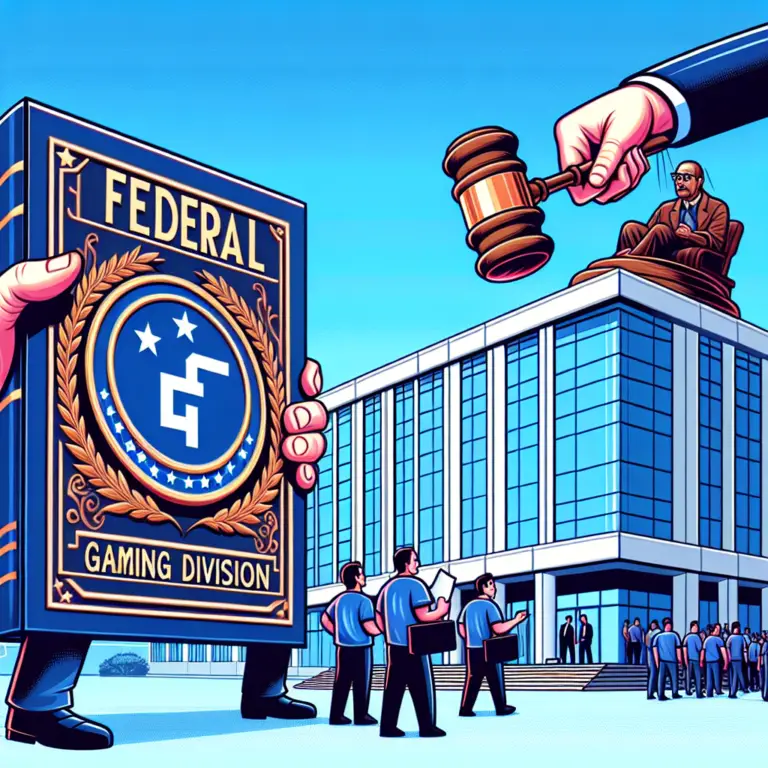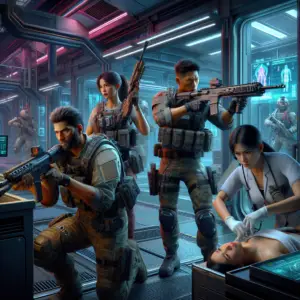FTC’s Complaint Against Microsoft Regarding Layoffs in the Gaming Division Post-Activision Blizzard Merger
The US Federal Trade Commission (FTC) has filed a complaint against Microsoft following the tech giant’s decision to lay off 1,900 employees from its gaming division. This move came shortly after Microsoft’s acquisition of Activision Blizzard, which the FTC argues contradicts Microsoft’s previous commitment to maintain the studio’s operational independence. The FTC’s concern is that these layoffs could complicate the agency’s ability to enforce antitrust laws if it wins its case against the merger. For more information on layoffs in the gaming industry, see our article on the subject.
The FTC’s complaint suggests that Microsoft’s actions are inconsistent with its earlier representations to the court that the two companies would operate independently post-merger. The layoffs, described as part of an ‘execution plan’ to reduce ‘areas of overlap’ between Microsoft and Activision, seem to undermine the notion of independence. This has raised questions about Microsoft’s intentions and the potential impact on the competitive landscape within the gaming industry, raising antitrust concerns.
The FTC is particularly concerned that the job cuts could hinder its ability to mandate effective remedies, such as divestitures, if it is determined that Microsoft’s acquisition of Activision Blizzard violated Section 7 of the Clayton Act. The layoffs are seen as a significant change to the structure and operation of the post-merger company, potentially affecting the FTC’s enforcement of antitrust regulations.
Microsoft has responded to the FTC’s allegations, stating that the layoffs cannot be solely attributed to the merger and that the company remains committed to its representations to the court. However, the FTC’s complaint has cast doubt on this assertion, highlighting the need for a closer examination of Microsoft’s post-merger activities.
Background of the Microsoft-Activision Blizzard Merger
The merger between Microsoft and Activision Blizzard has been a significant event in the gaming industry, marked by regulatory scrutiny and legal challenges. Below is a timeline of key events that outline the progression of the merger:
| Date | Event |
|---|---|
| October 2023 | Microsoft completes its takeover of Activision Blizzard. |
| 2023 | The UK’s Competition and Market Authority approves the deal, reversing its previous stance. |
| 2023 | The FTC files a lawsuit to block the takeover. |
| 2023 | A request for a temporary injunction against the takeover is denied, allowing Microsoft to proceed with the acquisition. |
The FTC’s lawsuit aimed to prevent the merger on the grounds that it could potentially violate antitrust laws. Despite the legal challenge, Microsoft was able to finalize the acquisition, although the FTC’s case against the merger continues. The outcome of this case could have significant implications for both companies and the broader gaming industry. For more insights into Microsoft’s game plan for Activision Blizzard’s classic titles, read our detailed article.
FTC’s Argument and Microsoft’s Counter
The FTC’s argument against Microsoft’s post-merger operations with Activision Blizzard raises concerns about the preservation of competition and the integrity of the merger agreement. Here are the main points of contention:
- The FTC alleges that Microsoft’s layoff of nearly 2,000 employees contradicts its commitment to operate Activision Blizzard as an independent studio post-merger.
- Microsoft reportedly had plans to reduce ‘areas of overlap’ between the two companies, which the FTC argues goes against the suggestion of independent operation.
- The FTC fears that the job cuts could undermine its ability to enforce effective remedies, such as divestitures, if the merger is found to violate antitrust laws.
In response to these claims, Microsoft has presented a counter-argument:
- Microsoft contends that the layoffs are not solely due to the merger, as Activision Blizzard was already planning job reductions prior to the acquisition.
- The company insists that it has structured the post-merger operations in a way that would allow for divestiture of Activision businesses if required by the court.
- Microsoft maintains that it stands behind its representations to the court and that the FTC’s claims are “incomplete and misleading.”
The dispute highlights the complexities of merger agreements and the challenges regulators face in ensuring such deals do not harm market competition. The FTC’s scrutiny of Microsoft’s actions post-merger is a critical aspect of this ongoing legal battle.
Implications of the Layoffs
The layoffs at Microsoft’s gaming division following the merger with Activision Blizzard have significant implications for the FTC’s enforcement of antitrust laws. The FTC is concerned that the reduction of nearly 2,000 employees could impede its ability to mandate effective remedies, such as divestitures, if the merger is found to violate Section 7 of the Clayton Act.
The potential impact of the layoffs includes:
- Complicating the FTC’s case by altering the pre-merger structure of Activision Blizzard, which could affect the feasibility of reverting to the company’s independent state.
- Undermining the FTC’s ability to order divestitures, as the layoffs might weaken Activision Blizzard’s position as a robust market participant.
- Challenging the FTC’s efforts to maintain competitive balance in the gaming industry, as the layoffs could be seen as a move to consolidate Microsoft’s market power.
The outcome of the FTC’s case against Microsoft could set a precedent for how mergers are conducted and regulated in the future, especially in the rapidly evolving tech and gaming sectors. The case continues to be a closely watched legal battle with far-reaching consequences for both companies and the industry at large. For more on the implications of layoffs in the gaming industry, see our related article.
Microsoft’s Assurances and Actions
There appears to be a discrepancy between the assurances Microsoft provided to antitrust authorities and its subsequent actions following the acquisitions of Bethesda and Activision Blizzard. The FTC has pointed out that after acquiring Bethesda, Microsoft made multiple games exclusive to Xbox, despite earlier assurances to European antitrust authorities that it had no incentive to withhold games from rival consoles.
This pattern of behavior has raised concerns regarding the recent Activision Blizzard merger, where Microsoft’s layoff of a significant number of employees seems to contradict its commitment to maintaining the studio’s operational independence. The FTC argues that such actions could potentially limit competition in the gaming industry, which is a central concern in antitrust regulation.
The situation underscores the importance of monitoring and enforcing merger agreements to ensure that companies adhere to their commitments and do not engage in practices that could harm the competitive landscape. The FTC’s vigilance in this case reflects the challenges regulators face in holding companies accountable for their pre-merger promises. For more on Microsoft’s gaming strategy, read our analysis.
Update on the Situation
The current status of the FTC’s complaint against Microsoft has evolved with new developments. Microsoft has defended its position by stating that the FTC’s complaint “ignores the reality that the deal itself has substantially changed” since the initial statements were made. The company highlights two significant changes:
- The restructuring of the acquisition globally, as required by the UK competition authority, which resulted in Microsoft not acquiring the cloud streaming rights to Activision Blizzard games in the United States.
- A binding agreement signed with Sony to keep Call of Duty on PlayStation with terms that are reportedly even better than what Sony had before.
Microsoft also argues that the FTC’s claims are “incomplete and misleading,” emphasizing that the layoffs were part of pre-existing plans by Activision Blizzard and not solely a result of the merger. The company asserts that it is operating the post-merger entity in a manner that would allow for an easy divestiture of Activision businesses if such an order is issued by the court.
This update reflects the ongoing legal and regulatory negotiations that can occur in the aftermath of major mergers and acquisitions, particularly in dynamic industries like gaming. The situation continues to be monitored by industry observers and regulatory bodies alike. For more on the legal and regulatory environment in the gaming industry, read our report.
Author’s Perspective on the FTC’s Case Against Microsoft
Considering the current circumstances, it seems quite unlikely that the FTC will succeed in its case against Microsoft’s acquisition of Activision Blizzard. Despite the FTC’s allegations and the subsequent legal tussle, the merger has been completed, and Microsoft has continued to integrate Activision Blizzard into its operations.
The author suggests that while Microsoft’s actions have added complexity to the situation, the FTC deserves a fair opportunity to contest the merger if it believes antitrust laws have been violated. However, the reality of the situation indicates that the merger is effectively a done deal, and any attempts to reverse it would face significant legal and logistical challenges.
The fairness of the legal process is also called into question, as the FTC’s ability to enforce antitrust regulations may be impacted by Microsoft’s strategic moves post-merger. Nonetheless, the author acknowledges the importance of regulatory oversight in maintaining competitive markets and the right of the FTC to pursue its case against the tech giant. For an opinion on the FTC’s case against Microsoft, see our perspective.












